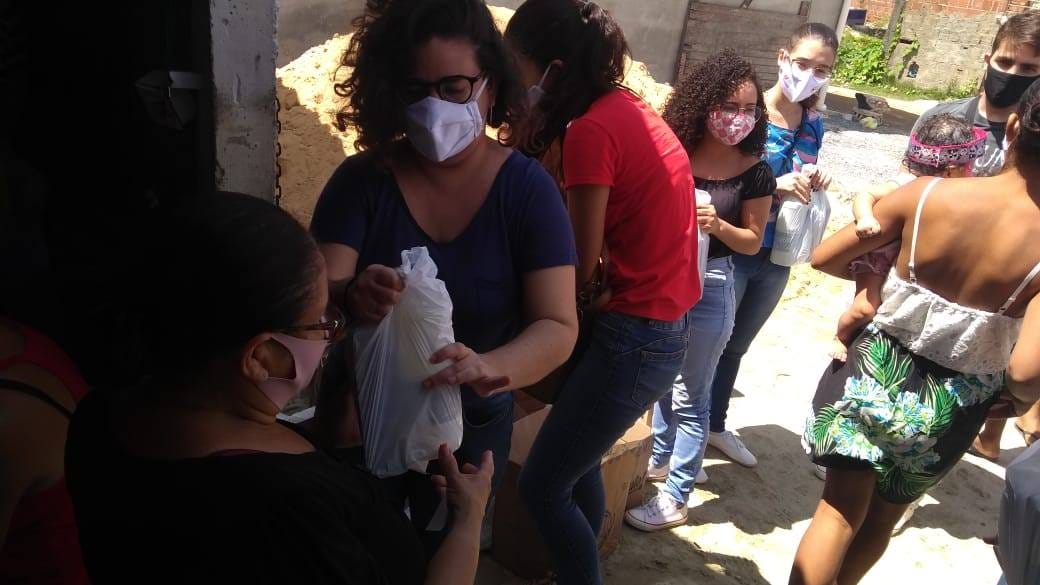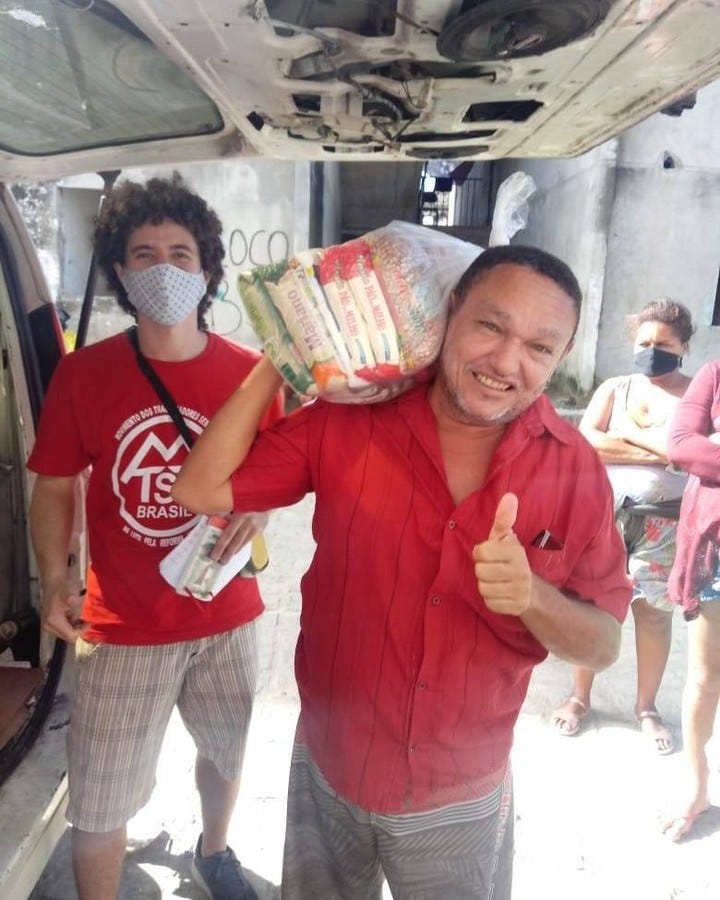Pivoting to Meet the Pandemic
Brazil's Homeless Workers' Movement is delivering on the frontlines

Homeless Workers’ Movement Volunteers distribute hygiene kits in the Aliança com Cristo neighborhood in Recife.
Right at the end of the before times , in mid-March, Rudrigo Rafael Souza e Silva, or Rud as he’s more commonly known, was talking with a colleague, Mery, during a break in FASE’s national meeting. FASE is a Brazilian non-profit that promotes alternatives to the dominant model of development, prioritizing environmental and social justice. Rud works with FASE and is also a national coordinator for Brazil’s Homeless Workers’ Movement (MTST).
The two were standing in the hallway outside a meeting room in FASE’s offices just off the main thoroughfare in Recife, where a cement-lined canal carries untreated sewage. Dust motes hung in the late summer air as sunlight filtered into the hall from a corrugated plastic skylight. The pair were fretting about the well-being of the hundreds of thousands of low-income Brazilians whose lives were going to be upended by COVID19 and about what they could do about it. In particular, they were talking about an occupied neighborhood on the edge of Recife, Carolina de Jesus, which took its name from a Black woman writer.
COVID19 had already devastated Italy and Wuhan and prompted stay-at-home orders across the United States. In Brazil, where roughly a quarter of the residents in major cities like Rio de Janeiro and São Paulo live in informal communities, favelas, Rud and Mery worried about everything from access to water and food to whether the housing conditions in these areas even allowed for social distancing.
As the two confabulated in the hall, Rud recalls Taciana passing by. She works with FASE’s national foundation, and their distress prompted her to join the conversation. “Oh, don’t you think we could take the money available from the project to do something there?” Rud says she asked.
FASE Recife had been planning an in-person workshop with youth for some time. As the pandemic spread, Rud says he and others discussed how to hold it safely, exempting those who didn’t feel comfortable and those in high-risk groups. Cancelling the event entirely, however, meant that the budget for food and materials would no longer be spent. Could the surplus be re-allocated?
“Yeah, I think we could do that,” Rud remembers Taciana reassuring them.
Shifting spending is just one of the ways the groups like FASE pivoted to cope with the pandemic. The Homeless Workers Movement, meanwhile, launched a number of initiatives in cities across Brazil. Those range from bringing organic produce to low-income families to creating a messaging system so that people can consult with medical professionals without leaving their homes.
In 2019, the MTST ran a campaign to address food shortages, Periphery Without Hunger. Already leading up to the pandemic, Rud described a crisis situation. “It’s a scenario from the 90s. People don’t have money to buy [cooking] gas, so they are going back to cooking with wood, with improvised fires because there’s no money.” Another MTST member described families buying bread instead of rice, even though bread is more expensive, because they can’t afford the cooking gas. Dramatic increases in rice prices have led to an 30% increase in purchases of organic rice from the MTST’s sister organization, the Landless Workers’ Movement (MST)
In Recife, where many families don’t have reliable access to running water, the first MTST care packages were hygiene kits. On a Friday afternoon, days after the conversation in the hallway, Rud and a few others brought kits for each of the 78 families living in the Carolina de Jesus community.
The occupation sits in the Barro neighborhood on the western edge of Recife some 50 meters from a metro stop. A paved road runs through the community, and in the summer, a coverlet of dust settles on it and everything else. Hundreds of families moved here in February 2017. They demanded that the state, which owns the land, allocate it to an affordable housing program thus giving them authorization to stay.
Nonetheless, the neighborhood isn’t hooked up to the city’s sewer and water infrastructure. In 2016, COMPESA, the agency charged with handling these services, said that less than half of Recife was connected, a figure that drops further outside of the city proper.
As a result, hygiene kits aim to bridge the gap for families who don’t have access to running water for repeated handwashing – and who may not have the resources to purchase cleaning supplies. Bleach, disinfectant, bars of soap for clothes washing and personal use, laundry detergent and toilet paper were all included in the kits.
Not long after this effort, the national MTST launched a crowdfunding campaign to expand such efforts across the country. The campaign’s slogan was “Doing what the government doesn’t do.” It raised more than 1.2 million Reals (roughly US$ 200,000) from nearly 10,000 donors.

An MTST volunteer distributes bags of basic food stuffs in a Recife community.
Since the start of the pandemic, community organizing has also had clear policy impacts.
A coalition of groups came together in Recife to monitor access to water, framing it as essential to preventing the spread of the disease. The city’s Public Defender stepped up as well, demanding that COMPESA ensure a regular water supply.
“In Recife, it’s traditional that even families that have access to water, to the system, even they deal with a day with water and a week without, periods without a supply,” he explained. “We were able to raise a debate within society that, ultimately, had been normalized,” Rud said of the water access issue.
Habitat for Humanity, whose Brazil headquarters are in Recife, has worked with the MTST and other organizations, like the Central Única das Favelas (CUFA), have also installed cisterns with hand-washing stations in favelas around the country.
Along with infrastructure interventions, the MTST has also developed messaging systems to provide medical advice and support to victims of domestic violence during the quarantine. Members also helped individuals navigate the online application system for the government pandemic subsidy meant to replace lost income.
Lisangela Jesus da Silva, 41, says she took her time sizing up the MTST before getting involved. Jesus da Silva lives in the Aliança com Cristo occupation in the Jiquiá neighborhood of Recife. She moved to the occupation as it began in 2015.
“I lived on the side of a canal that would always overflow in the winter,” she says. “So, I decided to occupy.”
Jesus da Silva says that before encountering the MTST in the occupied community, she was unfamiliar with social movements. So, she observed.
“I watched, and I watched, and I saw that it was a really good thing,” she says. “I always liked helping. And when I saw that I could help a number of people, I wanted to participate in the MTST.” Now, Jesus da Silva is a state-level representative for the movement.
In July, Jesus da Silva’s sister, Karina, fell ill. Karina had given birth two months earlier and was breast feeding. Her symptoms made the family worry she had caught COVID-19. So, Jesus da Silva reached out to the MTST’s “medical brigade,” a WhatsApp messaging group where physicians provide consultations remotely. The system enables people to receive medical care amidst both fears of seeking treatment in a hospital or clinic because of the pandemic. Some clinics have also shifted to focus solely on the virus, diverting patients with non-COVID symptoms elsewhere.
“The doctor thought it was Chikungunya,” Jesus da Silva said, and prescribed an analgesic to help with Karina’s joint pain. “She thought it was great,” Jesus da Silva says of her sister’s experience with the messaging consultation. “It was really different for us, but it was really necessary.”
Millions of street vendors and other informal-sector workers in Brazil lost their livelihoods as quarantine orders shut down the economy. So, the MTST used money from its crowdfunding campaign to pay women to sew masks. In Fortaleza, for example, six women are employed and have produced approximately 200,000 masks. The masks are distributed in favelas and occupied communities along with the hygiene kits and packages of food. In Pernambuco, more than 200 tons of food have been distributed along with 100,000 masks.
Rud says the pandemic has offered the MTST an opportunity to enter into a closer dialogue with social movements in other Latin American countries.
“Last year already a new process of popular organization was taking place in Latin America,” Rud says. “Popular organizations end up taking up the frontline when it comes to people’s needs, and that’s even more true now,” he said. “Right now, we need prevention, not repression,” Rud said in a phone interview, outlining some of the movement’s concerns.
“At the beginning of the pandemic, a prominent debate was how governments were going to face the pandemic. Would it open spaces for intensifying this more militarized state character or would it create space for us to debate healthcare systems, social safety nets, food insecurity?”
Connecting to communities through food is a strategy the MTST has learned from organizers in Argentina, where community kitchens have been common for decades. The first city in Brazil to open a community kitchen was in São Gonçalo, in the state of Rio de Janeiro.
“The Rio de Janeiro context, where paramilitary groups have a strong influence…makes it really difficult to fight for housing because the territorial control is maintained through great violence,” Rud says. For example, in Rio, one couple’s home was bombed after they complained to police about a local paramilitary group.
“So, the question is, how do you not enter into a dispute and expose people´s lives to this risk while building a territorial action that is able to bring people together?”
The success of the community kitchen in São Gonçalo prompted local MTST groups across Brazil to replicate the model. Along with this approach of cooking and providing meals, the MTST is also collaborating with local organic farmers groups to bring fresh produce to low-income families.
“Starting with dialogue with small farmers and organic producers, in many states, we’ve been able to bring items to families’ tables that, in supermarkets, for example, are much more expensive,” Rud says. The deliveries cost families nothing and are paid for with cash raised through crowdfunding efforts.
“We’ve been able to politicize this debate, in this sense, to address the issue that what we eat shouldn’t be full of pesticide, full of poison. We have a right to eat, and to eat in a way that is good and healthy.”
Ultimately, Rud says, the pandemic has given the movement an opportunity to build solidarity and alternative systems. “We had to go through a pandemic to see that the reality we were living in was absurd,” he said. “We’re starting with hope,” he said, referencing the healthcare and food systems as well as a basic income. “[We need] to intensify what we’re doing and to show the possible pathways.”
This post was updated September 16th with information about the bump in purchases of MST’s organic rice.


